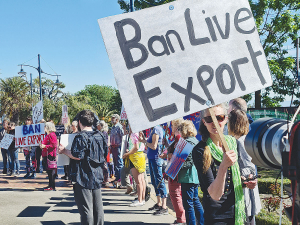A New Zealand animal welfare expert has described live export animals as "a disgraceful trade".
Dr John Hellstrom, a former chief veterinarian at Ministry for Primary Industries and chair of the National Animal Welfare Advisory Committee, told Dairy News that's why he has launched a petition to stop a proposal by the new Government to overturn a ban on the live exports.
Hellstrom, whose role is to advise government on animal welfare standards, says the move to reinstate live exports of mainly dairy cows is a retrograde step.
Associate Minister of Agriculture Andrew Hoggard has been reported saying the Government has sought advice on any amendments, and that it would go to full public consultation.
Hellstrom has been a long-time opponent of the live animal trade and says such a move could put at risk NZ's reputation as a primary exporter of quality sustainable products. He says both the Europeans and British will not be happy with NZ, because they are moving away from such practices.
Hellstrom says it took 40 years of arguments and debate to get the live animal export trade banned and a resumption would reduce our welfare standards. He says while the journey on ships today isn't as bad as the poor standards of the past, they are still bad.
"There is no doubt that cows suffer on these voyages, despite the best intentions. Even if they put weight on, they still have their social hierarchy disrupted, they are subjected to rough sea voyages, often they can't lie down or [they] get thrown around and sometimes thye have lie down in their own faeces," he says.
Hellstrom says today it is still a two or three-week voyage where up to eighty cows will be crammed into a container-sized area. And when they reach their destination, he says they will not enjoy the protection of the animal welfare rules in place in NZ. Hellstrom says instead most of the animals will end up in feed lots and never see grass again.
"They will live short and brutish lives," he says.
Hellstrom says even the best feedlot operation in the world is nowhere near as good as pastoral farming in NZ. He says if NZ was exporting to countries which has equivalent animal welfare legislation and protected farming practices, he wouldn't be that concerned about it. But says he cannot emphasise how little concern is taken for these animals at the other end.
He says the move to reinstate live exports appears to have come from a small minority of farmers. He's aware that many other farmers are against live exports because they can see the potential reputational risk to NZ.
Hellstrom also questions just how much such a trade would be worth to the NZ economy, saying the numbers he's seen are "all over the place".
The petition has only been going a few weeks and already Hellstrom says there has been a strong response to it. The aim he says is to keep it open until June before handing it into Parliament, but if the present Government acts quickly on the legislation, he will close the petition off earlier to make sure it can be presened to Parliament.
SPCA Supports Ban
The SPCA has come out strongly in support of the petition. The organisation's chief scientific officer Dr Arnja Dale says photographs taken on board live export vessels have circulted the globe, showing livestock on long volatile voyages caked in urine and faeces, suffering from heat stress, injuries, and infection. She questions whether the new governent learned anything from the horrendous scenes over the past month.
Dale says while Prime Minister Luxon's Government is said to be determined to resume live exports by sea, the United Kingdom and Australia among other agri-economies have made strides towards phasing out live exports, infludenced by swelling public sentiment against the practice.
"It's excruciating that our members of parliament, many of whom love flying the flag for farmers, would willingly subject animals to grossly unsafe conditions while putting the reputation of our $54 billion-dollar wider food and fibre export sector at risk," she says.


















